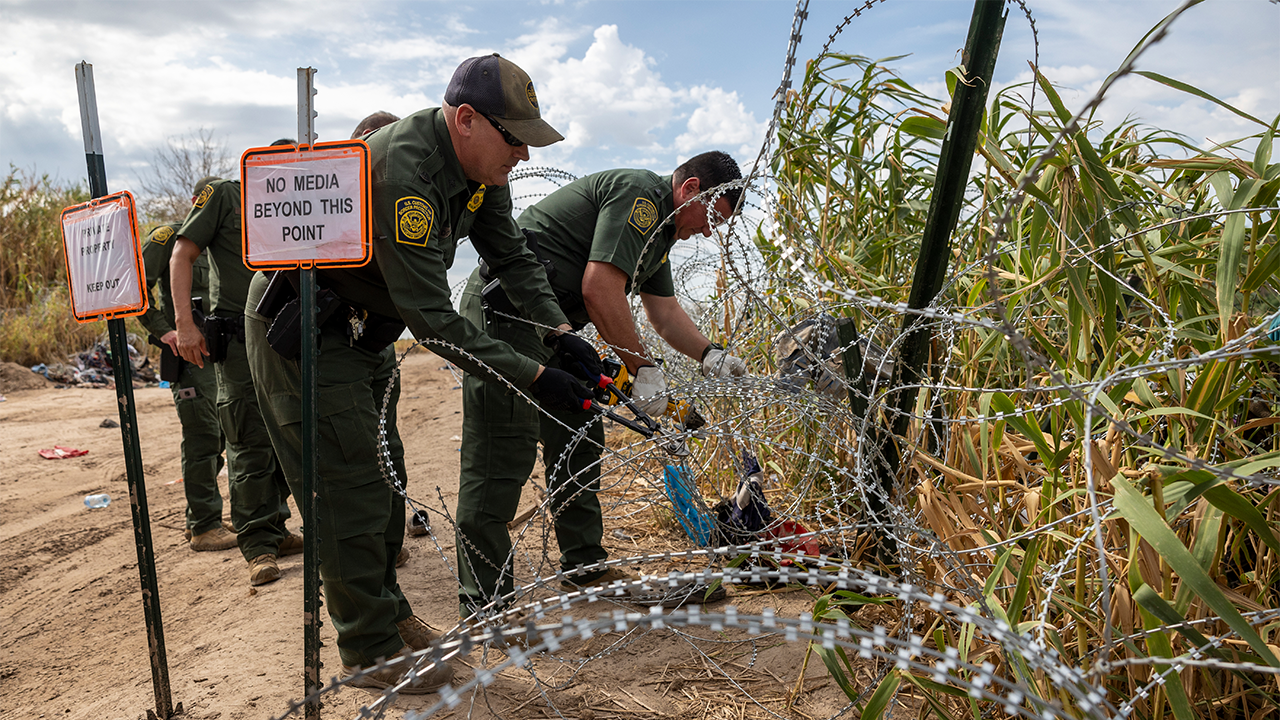Mississippi
Mississippi candidates for statewide offices square off in party primaries – WTOP News

JACKSON, Miss. (AP) — A bitter Republican primary for lieutenant governor is one of several races to watch in Mississippi…
JACKSON, Miss. (AP) — A bitter Republican primary for lieutenant governor is one of several races to watch in Mississippi party primaries.
Republicans currently hold all eight statewide offices and a majority in the state House and Senate.
Polls are open 7 a.m.-7 p.m. Tuesday.
Primary runoffs are Aug. 29. The general election is Nov. 7, with runoffs Nov. 28. Here is a preview of statewide contests:
LIEUTENANT GOVERNOR
Republican incumbent Delbert Hosemann is challenged by state Sen. Chris McDaniel and educator Tiffany Longino. In November, the Republican primary winner will face business consult D. Ryan Grover, who is unopposed for the Democratic nomination.
Hosemann is seeking a second term as lieutenant governor after serving three terms as secretary of state. He has touted a teacher pay raise, millions in new funding for public education, and a budget surplus. Hosemann has also called McDaniel a “pathological liar” and accused his campaign of “despicable” behavior.
McDaniel, of Ellisville, is a four-term state legislator who has lost two races for U.S. Senate in the past decade, including a 2014 election that he refused to concede. He says Hosemann isn’t conservative enough and has appointed too many Democrats to committees chairmanships in the state Senate. Both candidates have tied themselves to former President Donald Trump.
Longino, of Brandon, says she wants to expand Medicaid to cover people who work in jobs that pay modest wages and don’t provide private health insurance.
Grover, of Hattiesburg, says he wants to clog Mississippi’s “Brain Drain.” The state is losing too many educated young people, which is hampering economic growth, Grover says.
The lieutenant governor presides over the 52-member Mississippi Senate, appoints senators to committees and names the committee leaders.
ATTORNEY GENERAL
Republican incumbent Lynn Fitch and Democratic challenger Greta Kemp Martin do not have party primaries.
Fitch was first elected attorney general in 2019 after two terms as state treasurer. Under Fitch, the state attorney general’s office argued the case that the U.S. Supreme Court used in 2022 to overturn Roe v. Wade, the 1973 ruling that legalized abortion rights nationwide.
Kemp Martin is an attorney for Disability Rights Mississippi. She says Fitch was wrong to push the case that overturned Roe v. Wade, and women are worse off because Mississippi and some other states have restricted women’s access to healthcare.
SECRETARY OF STATE
Republican incumbent Michael Watson and Democratic challenger Shuwaski Young do not have party primaries.
Watson was elected secretary of state in 2019 after three terms in the state Senate. He says his office is working to build confidence in Mississippi’s election process. That has included backing a law to strengthen proof of citizenship requirements for voting and shoring up paper trails for voting machines. If re-elected, Watson says he will conduct post-election audits in all 82 counties.
Young worked in the Department of Homeland Security during Barack Obama’s presidency and in the Secretary of State’s Office under Democrat Eric Clark and Republican Delbert Hosemann. Young launched his campaign for secretary of state after running unsuccessfully for Mississippi’s 3rd District congressional seat in 2022. Young wants to expand early voting and allow online voter registration. He also pledged to work with Republicans to monitor the state’s voter rolls.
TREASURER
Republican incumbent David McRae and Democratic challenger Addie Green do not have party primaries.
McRae was first elected treasurer in 2019 after running unsuccessfully for the office in 2015. He says he opposes screening investments based on corporations’ environmental, social and governance strategies.
Green is a former Bolton alderwoman and has run unsuccessfully for other offices, including treasurer in 2019 and state agriculture commissioner in 2015. She says Mississippi should set a $15-an-hour minimum wage, up from the $7.25 federal minimum.
AUDITOR
Republican incumbent Shad White and Democratic challenger Larry Bradford do not have party primaries.
White was appointed by then-Gov. Phil Bryant in 2018 and was elected to a full term in 2019. White’s office investigated the misspending of $77 million of federal welfare funds that were diverted to allies of Bryant. The Republican former governor has not been charged with a crime.
Bradford, a former mayor of Anguilla, says he would focus on protecting public money and would not get distracted by hot-button social issues. He criticizes White for attacking Diversity, Equity and Inclusion initiatives at public universities.
INSURANCE COMMISSIONER
Incumbent Mike Chaney faces challenger Mitch Young in the Republican primary. Bruce Burton is unopposed for the Democratic nomination.
Chaney was elected insurance commissioner in 2007 after serving in the state House and Senate. He says he has focused on making insurance more affordable, and he has touted efforts to investigate complaints and help residents recover from natural disasters.
Young, who ran unsuccessfully for governor in 2015, served in the U.S. Navy from 1979 to 1999. He has also worked as a machinist and engineer. Mississippi’s insurance industry needs to be better regulated so it can avoid the problems that have beset disaster-prone states like Florida, Young says.
Burton is a Belzoni-based attorney. He has run unsuccessfully for other offices, most recently in 2022 for a judgeship on the Mississippi Court of Appeals.
AGRICULTURE COMMISSIONER
Republican Andy Gipson is a former state representative who has been agriculture commissioner since 2018, when then-Gov. Phil Bryant appointed him to the vacant job. Gipson was elected agriculture commissioner in 2019.
Three candidates are seeking the Democratic nomination: Robert “Brad” Bradford, Bethany Hill and Terry Rogers.
Bradford is the emergency manager director in Adams County. He’s a military veteran and a fourth-generation farmer from the Mississippi Delta.
Hill grew up on a farm in north Mississippi, and she publicly supported the effort to legalize medical marijuana in the state.
Rogers, 19, is the youngest candidate in the race. He says he supports having a Future Farmers of America chapter in each high school to encourage young people to consider agriculture jobs.
Copyright
© 2023 The Associated Press. All rights reserved. This material may not be published, broadcast, written or redistributed.

Mississippi
Thanksgiving on Mississippi Public Broadcasting Think Radio, set to air on Thursday, November 28th

MISSISSIPPI (KTVE/KARD) — For Thanksgiving, on Thursday, November 28, 2024, the Mississippi Public Broadcasting Radio will air a special programming.
Photo courtesy of Mississippi Public Broadcasting
According to officials, “Turkey Confidential” and “Feasting with the Great American Songbook: An Afterglow Thanksgiving Special” will run from 9 a.m. to 1 p.m. Francis Lam will be taking calls and help those in need of Thanksgiving cooking tips for the biggest cooking day of the year.
According to officals, “Feasting with the Great American Songbook: An Afterglow Thanksgiving Special” will explore classic jazz and popular songs about food by singers like Louis Armstrong, Louis Jordan, and Fats Waller, perfect for listening while sitting at the table.
Mississippi
Southeast Mississippi Christmas Parades 2024 | WKRG.com

MISSISSIPPI (WKRG) — It’s beginning to look a lot like Christmas on the Gulf Coast and that means Santa Claus will be heading to town for multiple parades around the area.
WKRG has compiled a list of Christmas parades coming to Southeast Mississippi.
Christmas on the Water — Biloxi
- Dec. 7
- 6 p.m.
- Begins at Biloxi Lighthouse and will go past the Golden Nugget
Lucedale Christmas Parade
Mississippi
‘A Magical Mississippi Christmas’ lights up the Mississippi Aquarium

GULFPORT, Miss. (WLOX) – The Mississippi Aquarium in Gulfport is spreading holiday cheer with a new event, ‘’A Magical Mississippi Christmas.’
The aquarium held a preview Tuesday night.
‘A Magical Mississippi Christmas’ includes a special dolphin presentation, diving elves, and photos with Santa.
The event also includes “A Penguin’s Christmas Wish,” which is a projection map show that follows a penguin through Christmas adventures across Mississippi.
“It’s a really fun event and it’s the first time we really opened up the aquarium at night for the general public, so it’s a chance to come in and see what it’s like in the evening because it’s really spectacular and really beautiful,” said Kurt Allen, Mississippi Aquarium President and CEO.
‘A Magical Mississippi Christmas’ runs from November 29 to December 31.
It will not be open on December 11th, December 24th, and December 25th.
Tickets can be purchased online or at the gate.
The event is made possible by the city of Gulfport and Coca-Cola Bottling Company.
See a spelling or grammar error in this story? Report it to our team HERE.
Copyright 2024 WLOX. All rights reserved.
-

 Science1 week ago
Science1 week agoTrump nominates Dr. Oz to head Medicare and Medicaid and help take on 'illness industrial complex'
-
/cdn.vox-cdn.com/uploads/chorus_asset/file/25739950/247386_Elon_Musk_Open_AI_CVirginia.jpg)
/cdn.vox-cdn.com/uploads/chorus_asset/file/25739950/247386_Elon_Musk_Open_AI_CVirginia.jpg) Technology1 week ago
Technology1 week agoInside Elon Musk’s messy breakup with OpenAI
-

 Health5 days ago
Health5 days agoHoliday gatherings can lead to stress eating: Try these 5 tips to control it
-

 Health3 days ago
Health3 days agoCheekyMD Offers Needle-Free GLP-1s | Woman's World
-

 Science2 days ago
Science2 days agoDespite warnings from bird flu experts, it's business as usual in California dairy country
-

 Technology1 day ago
Technology1 day agoLost access? Here’s how to reclaim your Facebook account
-

 Science1 week ago
Science1 week agoAlameda County child believed to be latest case of bird flu; source unknown
-

 Sports1 week ago
Sports1 week agoBehind Comcast's big TV deal: a bleak picture for once mighty cable industry
















